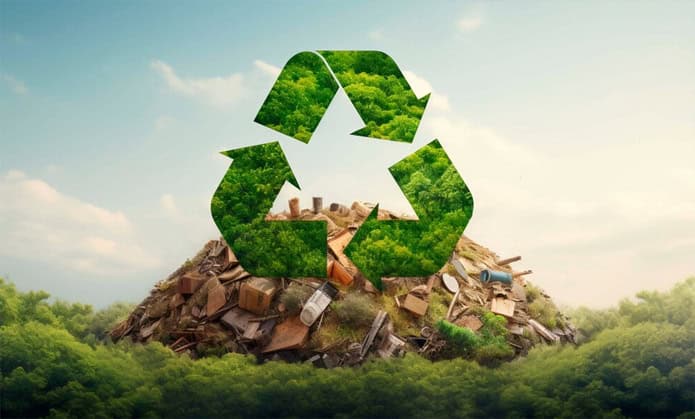
Who is responsible for covering recycling costs and reintegrating products into the circular economy? This question has become more common among regulators in recent years.
Previously, local governments would cover the costs of recovering, recycling, and reintegrating waste materials into the economy. Unfortunately, not all countries have the necessary funds to accomplish this. Additionally, some countries that can do so have resorted to exporting significant waste to developing nations.
Waste mismanagement adds to the plastic pollution crisis, affecting some of the world’s most delicate natural environments.
Governing bodies have proposed a solution to address this problem: implementing Extended Producer Responsibility (EPR) and placing the burden on businesses. Are you curious to learn more about this legislation? Continue reading to discover this topic’s mechanics, industries affected, and significance.
What is Extended Producer Responsibility (EPR)?
EPR is a regulatory system that ensures brands and other enterprises are responsible for the waste their products generate.
The framework encourages companies to transition to a more sustainable, circular economy by reconsidering product design, promoting item reusability, and improving recycling collection rates.
EPR tackles pollution at its source by addressing the root cause of waste: difficult-to-recover and reuse packaging.
EPR was first introduced in the early 1990s. The OECD has formalized this approach, defining it as an environmental policy where a producer’s responsibility extends to the post-consumer stage of a product’s life cycle.
How does it work?
The process of extended producer responsibility laws can vary depending on the country where your business is located.
Typically, businesses that make profits and generate waste will be held responsible.
Businesses that are required to do so must implement a comprehensive EPR plan. This plan will assist them in addressing the waste issue by outlining strategies to reduce waste production rates.
EPR plans can have different requirements, such as reducing plastic packaging, improving recycling efficiency, or supporting plastic recovery projects.
After implementing the EPR plan, a third party will conduct regular audits to ensure compliance with the law.
Which countries have EPR laws in place?
Many countries are now adopting EPR laws to reduce waste.
Like any intricate policy, EPR is not universally applicable, so the success observed in certain countries may not be replicated elsewhere. This discrepancy is primarily due to variations in funding and resources.
Let’s examine the functioning of EPR in developed and developing countries.
EPR in developed countries
Several European Union (EU) countries have implemented EPR legislation for some time. The introduction of EPR law dates back to 1990 when Thomas Lindhqvist presented a report to the Swedish Ministry of the Environment.
France has a history of being at the forefront and started implementing EPR for certain materials in 1992. The policy has achieved remarkable success, with battery recycling rates reaching 80% in the last two decades and packaging waste recovery increasing by 50% since the programs were implemented.
Other countries, such as Canada, Belgium, and South Korea, have achieved recycling rates of over 75% for materials covered by EPR.
The packaging industry is fully aware of the importance of Extended Producer Responsibility (EPR) and is actively preparing to implement stricter regulations in countries such as the UK, France, and Germany. Even in the US, where recycling rates are disappointingly low, more states are embracing the policy.
All these countries share a common factor: they possess the necessary resources and funding to support EPR. Implementing this policy can be costly, as it involves acquiring new reporting tools, gaining knowledge in data-gathering, and setting up waste management facilities to handle increased amounts of recycled material.
Regrettably, the countries most affected by the waste crisis encounter significant challenges in implementing EPR.
EPR in developing nations
Although waste pollution has severely impacted many developing countries, they must implement EPR regulations.
Regrettably, individuals residing in these regions may face significant health concerns due to elevated waste levels. Every year, a staggering number of people in developing countries lose their lives due to diseases caused by mismanaged waste. The death toll ranges from 400,000 to 1 million.
Many nations lack the necessary infrastructure and funding to implement EPR laws, which could help mitigate the effects of plastic pollution.
Significant improvements in waste management processes in developing nations are needed before the successful implementation of EPR can occur.
According to Dr. Lewis Akenji, a former director at The Institute for Global Environmental Studies, one of the challenges is that developing countries are attempting to implement the EPR model designed by and for industrialized nations.
In July 2022, the Philippines took a significant step forward by introducing its first-ever EPR legislation to address the plastic waste crisis. This is a momentous development for the country.
Under this legislation, big businesses have a new obligation to manage the packaging they produce and must ensure that they recycle 80% of their plastic waste by 2028.
How does EPR legislation reduce waste exports to developing countries?
By implementing EPR regulations, developed countries will reduce the amount of waste they export to countries with lower GDP.
In 2020, approximately 5 million tons of plastic waste were traded worldwide. Unfortunately, developed countries frequently export this waste to less affluent nations instead of responsibly recycling or disposing of it.
This figure is surprisingly high, but it has decreased by over a third since 2010 due to new environmental legislation worldwide, including EPR.
With the introduction of EPR, brands now have a greater incentive to monitor the entire lifecycle of their waste rather than just its production. With the decrease in fees, companies are now more inclined to create materials that can be quickly recovered, reducing the amount of material being sent overseas.
Regulations have become more stringent, and consumer demand has risen, increasing the need for secondary recycled material. High-income countries are realizing the financial advantages of adopting circularity, a more responsible approach to waste management. Unfortunately, the developing nations bear the brunt of the negative consequences.
Top 5 benefits of EPR legislation
Introducing more stringent EPR laws worldwide has numerous benefits, the most apparent being its effectiveness in addressing the waste issue.
Look at the top five advantages listed below for a more comprehensive understanding.
1. Helps decrease waste pollution
Studies indicate that the ocean is home to a staggering number of plastic pieces, estimated to be over 170 trillion. In addition to the existing challenges, global waste levels are projected to rise to 3.4 billion metric tons by 2050, a significant 70% increase compared to current levels.
Implementing stricter EPR legislation can help prevent this situation from getting worse.
Companies can be held accountable for waste if these laws are implemented correctly. This would allow us to clean up the plastic littering the planet and prevent further buildup.
2. Economic benefits
EPR laws have a positive impact not only on the environment but also on the economy. As an illustration, the recycling industry in the US creates almost 20,250 manufacturing jobs and contributes $9.8 billion to the sector’s economy annually.
Furthermore, as developing nations like the Philippines start implementing EPR legislation, there will likely be an increase in job opportunities focused on promoting environmental sustainability.
3. Encouraging a circular economy
Moving away from single-use products and adopting a circular economy is important to minimize waste on our planet. Implementing EPR laws is essential to facilitating this transition.
This will have positive impacts on the environment, wildlife, and humans. According to the World Economic Forum, adopting a circular economy can lead to significant growth opportunities by 2030. This approach helps businesses become more efficient, reduces waste, and opens new employment opportunities.
4. Helps to conserve natural resources
By implementing a successful EPR strategy, countries can encourage recycling, material recovery, and the development of a circular economy to preserve valuable natural resources.
We should prioritize adopting this approach as soon as possible. The United Nations reports that resource extraction has increased over threefold since 1970.
Furthermore, the outlook for future consumption levels appears grim, particularly with the growing popularity of events like Black Friday. The amount of material used worldwide is projected to double to 190 billion tons by 2060, resulting in a significant 43% increase in greenhouse gas emissions.
5. Businesses can benefit from EPR incentives
EPR programs boost the economy and benefit businesses. In certain countries, expenses associated with EPR activities are considered essential costs and can be deducted from gross income.
Implementing an ERP strategy can also assist businesses in attracting a larger customer base as the trend of conscious consumerism grows. Global Google searches related to sustainable goods have increased significantly, by 71%, since 2016.
Summary
EPR legislation is a permanent fixture. It also has positive impacts on the economy, the environment, and businesses. We understand that ensuring your brand’s EPR compliance can be challenging. However, we are committed to assisting you regardless of your location.
Legislation for extended producer responsibility is being implemented in different countries to minimize waste produced by businesses. This law transfers the burden of product waste management from the government to the businesses operating in the country. The framework promotes a shift in mindset regarding product design, the ability to reuse items, and improving recycling collection rates. Here are some examples of EPR activities happening globally; Introducing recovery schemes, Setting up a recycling system and Transporting plastic waste efficiently.



